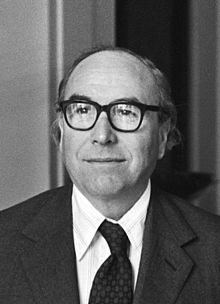Roy Jenkins
|
The Right Honourable The Lord Jenkins of Hillhead OM PC |
|
|---|---|
 |
|
| President of the European Commission | |
|
In office 6 January 1977 – 19 January 1981 |
|
| Preceded by | François-Xavier Ortoli |
| Succeeded by | Gaston Thorn |
| Leader of the Liberal Democrats in the House of Lords | |
|
In office 16 July 1988 – 19 December 1997 |
|
| Leader | Paddy Ashdown |
| Preceded by | The Baroness Seear (Liberal) |
| Succeeded by | The Lord Rodgers of Quarry Bank |
| Chancellor of the University of Oxford | |
|
In office 14 March 1987 – 5 January 2003 |
|
| Preceded by | The Earl of Stockton |
| Succeeded by | The Lord Patten of Barnes |
| Leader of the Social Democratic Party | |
|
In office 7 July 1982 – 13 June 1983 |
|
| Deputy | David Owen |
| Preceded by | The Gang of Four |
| Succeeded by | David Owen |
| Home Secretary | |
|
In office 5 March 1974 – 10 September 1976 |
|
| Prime Minister |
Harold Wilson Jim Callaghan |
| Preceded by | Robert Carr |
| Succeeded by | Merlyn Rees |
|
In office 23 December 1965 – 30 September 1967 |
|
| Prime Minister | Harold Wilson |
| Preceded by | Frank Soskice |
| Succeeded by | Jim Callaghan |
| Shadow Home Secretary | |
|
In office 25 November 1973 – 5 March 1974 |
|
| Leader | Harold Wilson |
| Preceded by | Shirley Williams |
| Succeeded by | Jim Prior |
| Deputy Leader of the Labour Party | |
|
In office 8 July 1970 – 10 April 1972 |
|
| Leader | Harold Wilson |
| Preceded by | George Brown |
| Succeeded by | Edward Short |
| Shadow Chancellor of the Exchequer | |
|
In office 19 June 1970 – 10 April 1972 |
|
| Prime Minister | Harold Wilson |
| Preceded by | Iain Macleod |
| Succeeded by | Denis Healey |
| Chancellor of the Exchequer | |
|
In office 30 November 1967 – 19 June 1970 |
|
| Prime Minister | Harold Wilson |
| Preceded by | Jim Callaghan |
| Succeeded by | Iain Macleod |
| Minister of Aviation | |
|
In office 18 October 1964 – 23 December 1965 |
|
| Prime Minister | Harold Wilson |
| Preceded by | Julian Amery |
| Succeeded by | Fred Mulley |
|
Member of Parliament for Glasgow Hillhead |
|
|
In office 25 March 1982 – 11 June 1987 |
|
| Preceded by | Tam Galbraith |
| Succeeded by | George Galloway |
|
Member of Parliament for Birmingham Stechford |
|
|
In office 23 February 1950 – 31 March 1977 |
|
| Preceded by | Constituency established |
| Succeeded by | Andrew MacKay |
|
Member of Parliament for Southwark Central |
|
|
In office 29 April 1948 – 23 February 1950 |
|
| Preceded by | John Martin |
| Succeeded by | Constituency abolished |
| Personal details | |
| Born |
Roy Harris Jenkins 11 November 1920 Abersychan, Wales |
| Died | 5 January 2003 (aged 82) Oxfordshire, England |
| Political party |
Labour (Before 1981) Social Democrats (1981–1988) Liberal Democrats (1988–2003) |
| Alma mater |
Cardiff University Balliol College, Oxford |
| Military service | |
| Allegiance |
|
| Service/branch |
|
| Rank | Captain |
| Unit | Royal Artillery |
| Battles/wars | Second World War |
Roy Harris Jenkins, Baron Jenkins of Hillhead, OM, PC (11 November 1920 – 5 January 2003) was a British Labour Party, SDP and Liberal Democrat politician, and biographer of British political leaders.
The son of a Welsh trade unionist (later a Labour MP and government minister), Roy Jenkins was educated at Oxford University and served as an intelligence officer in the Second World War. Elected to Parliament as a Labour member in 1948, he served in several major posts in Harold Wilson's First Government. As Home Secretary in 1965–1967, he sought to build what he described as "a civilised society", with measures such as the effective abolition in Britain of both capital punishment and theatre censorship, the decriminalisation of homosexuality, relaxing of divorce law, suspension of birching and the liberalisation of abortion law. As Chancellor of the Exchequer in 1967–1970, he pursued a tight fiscal policy. On 8 July 1970, he was elected Deputy Leader of the Labour Party, but resigned in 1972 because he supported entry to the Common Market, while the party opposed it.
When Wilson re-entered government in 1974 Jenkins returned to the Home Office, but increasingly disenchanted by the leftward swing of the Labour Party, he chose to leave British politics in 1976 and was appointed President of the European Commission in 1977, serving until 1981: he was the first and likely only British holder of this office considering the United Kingdom's decision to leave the European Union in June 2016. In 1981, dismayed with the Labour Party's leftward swing under Michael Foot, he was one of the "Gang of Four" – more centrist Labour MPs who formed the Social Democratic Party (SDP). In 1982 he won a famous by-election in a Conservative seat and returned to parliament; he was "Prime Minister Designate" of the SDP-Liberal Alliance in the 1983 election but after disappointment with the performance of the SDP he resigned as SDP leader.
...
Wikipedia
